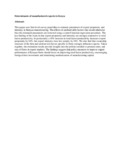| dc.contributor.author | Abala, Daniel Okado | |
| dc.date.accessioned | 2013-04-05T07:33:31Z | |
| dc.date.available | 2013-04-05T07:33:31Z | |
| dc.date.issued | 2012 | |
| dc.identifier.citation | DBA Africa Management Review 2012, Vol 3 No 1 pp. 50-72 | en |
| dc.identifier.uri | http://erepository.uonbi.ac.ke:8080/xmlui/handle/123456789/15390 | |
| dc.description.abstract | This paper uses firm level survey panel data to estimate parameters of export
propensity and intensity in Kenyan manufacturing. The effects of unobservable
factors that would otherwise bias the estimated parameters are removed using a
control function regression procedure. The key finding of the study is that export
propensity and intensity are strongly responsive to total factor productivity. In
particularly a 10% increase in total factor productivity increases export propensity
by 54%, but export intensity rises less steeply by 18%. We also find that ownership
structure of the firm and unobserved factors specific to firms strongly influence
exports. Taken together, the estimation results provide insights into the policies
needed to promote entry and stay of firms in export markets. The findings suggest
that policy measures to improve export performance of Kenyan firms should focus
on improving total factor productivity, encouraging foreign direct investment and
stimulating modernization of manufacturing capital. | en |
| dc.language.iso | en | en |
| dc.publisher | DBA Africa Management Review | en |
| dc.subject | Exports | en |
| dc.subject | Manufacturing firms | en |
| dc.subject | Total factor productivity | en |
| dc.subject | Control function approach | en |
| dc.subject | Kenya | en |
| dc.title | Determinants of manufactured exports in Kenya | en |
| dc.title.alternative | An application of control function approach | en |
| dc.type | Article | en |
| local.publisher | School of Economics, University of Nairobi | en |

